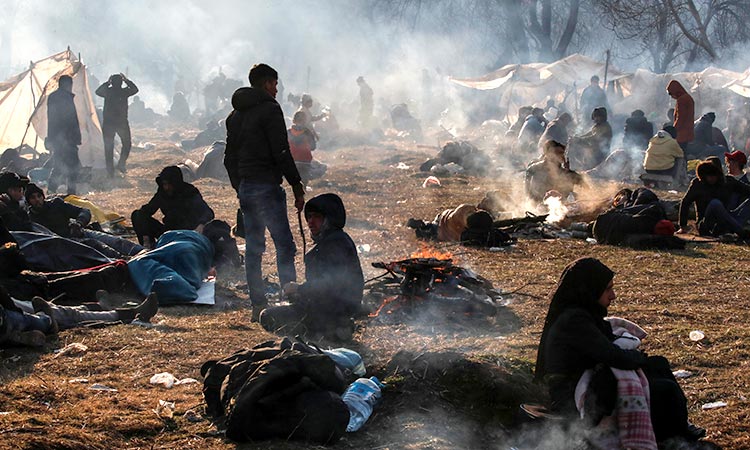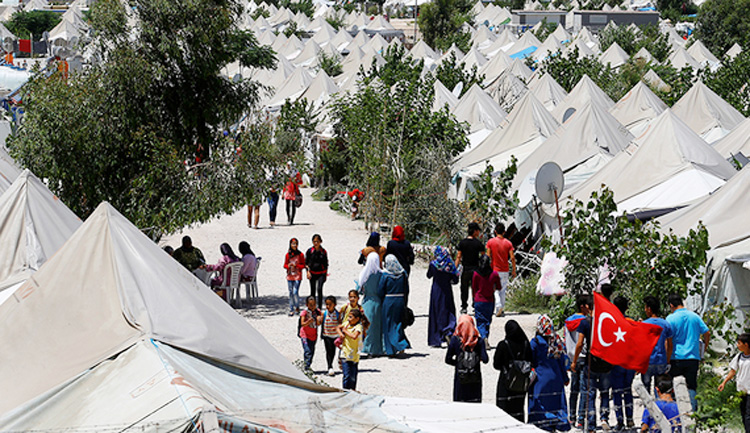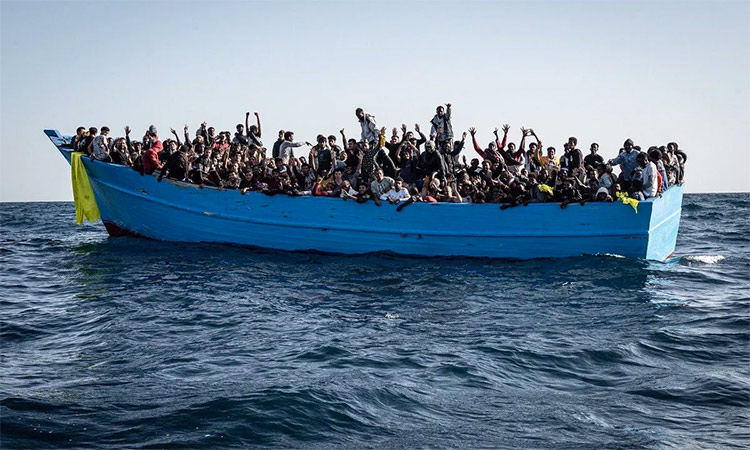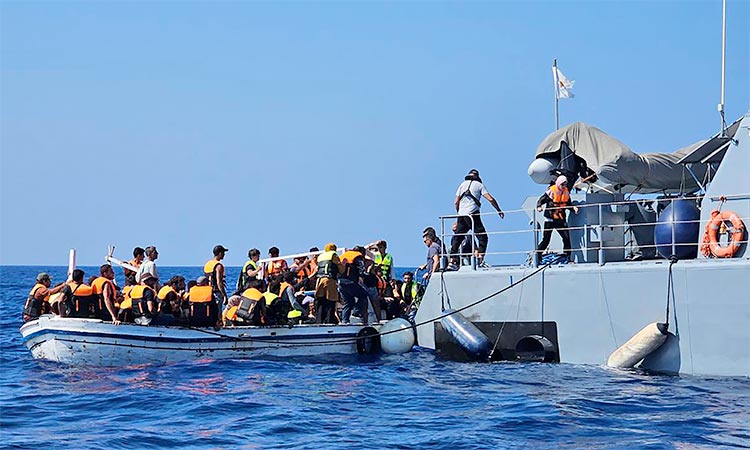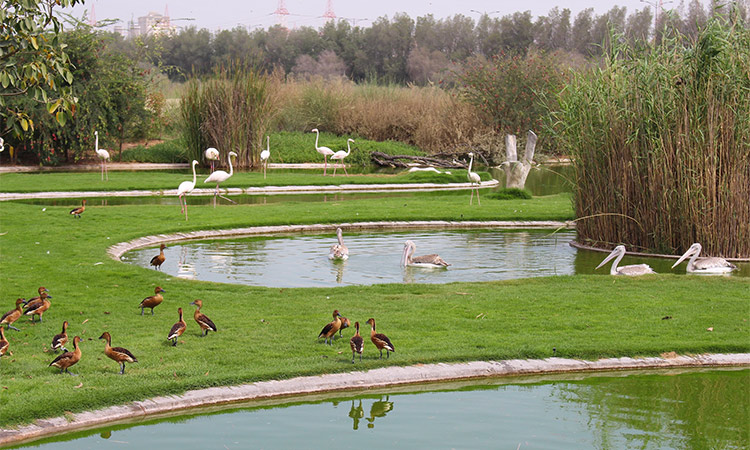Resentment against Syrian refugees is rising
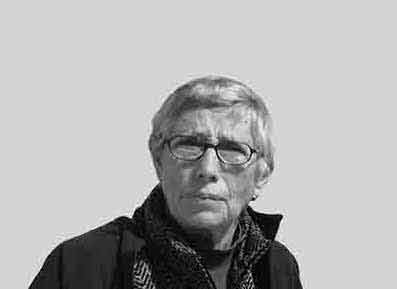
Michael Jansen
The author, a well-respected observer of Middle East affairs, has three books on the Arab-Israeli conflict.
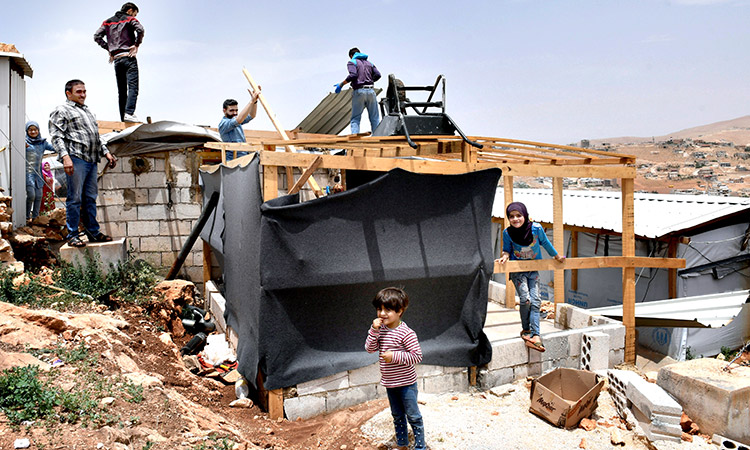
Syrian refugees remove a corrugated metal as they dismantle their shelters in Arsal, Lebanon. File/Reuters
This pressure is certain to increase because the three countries are facing major economic emergencies and international donor fatigue has left the UN and humanitarian agencies short of funds for sustaining the refugees. Resentment against Syrians amongst Lebanese, Jordanians and Turks is rising. The Russian reconciliation centre, which has been facilitating return, says that 500-800 refugees and displaced go home every week. But this is a drop in an ocean of 11 million Syrians uprooted by war.
A week ago the Lebanese army demolished Syrian refugee breeze-block homes in the flashpoint northeastern town of Arsal because they violated the law which bans refugees from constructing permanent shelters. Syrians are permitted to build only temporary shelters by stretching plastic tarps over wooden frames. The army had given refugees until July 1st to bring down illegal structures or face demolition. While only 20 were initially demolished, the order covers more than 3,500 refugee families in Arsal as well as thousands of Syrians living in permanent shelters across the country. The law is currently being enforced in the Bekaa Valley, Baalbek, and Hermel. The army has also been closing Syrian shops operating without permits, detaining Syrian men and boys who do not have residence permits and has deported Syrians who have crossed the border illegally.
Lebanon hosts nearly 1 million Syrian refugees registered with the UN but at least another 500,000 are living in the country. Before the war many unregistered Syrians were construction and agricultural labourers who normally resided in Lebanon for at least part of the year and returned home for harvest or holidays.
Although thousands can no longer go back to their hometowns and villages, the UN has not put them on its refugee rolls.
Beirut refuses to allow Syrians to settle permanently and to give them nationality. The majority of the refugees are Sunni Muslims. Their mass naturalisation would destroy Lebanon’s delicate political balance among Christians, Sunnis and Shias. Lebanon has also denied citizenship to Palestinian refugees hosted since Israel drove them from their country in 1948 for the same reason. UN-registered Palestinian refugees now live in breeze-block urban enclaves which the Lebanese do not want to see repeated.
Lebanon’s infrastructure has not recovered from 15 years of civil war (1975-90), leaving its citizens short of electricity and clean water and suffering from increasing pollution from human waste and vehicle emissions all of which are magnified by the presence of the Syrians.
President Michael Aoun says 169,000 have gone home while security chief Abbas Ibrahim puts the number at 100,000. A poll conducted by the UN found 83 per cent want to repatriate but only five per cent plan to depart soon.
Jordan, with nearly 700,000 registered Syrian refugees and another half-million unregistered Syrians, is also suffering from their presence. About 20 per cent live in organised camps while the rest have settled around the country. The Syrians consume Jordan’s scarce water, raise rents, crowd pubic schools, and accept lower pay when in employment. Only 10,000 Syrians have gone home since the main border crossing between Jordan and Syria opened last October although many are from the Deraa area in the south where Syria’s government re-established control last summer. The refugee problem has deepened popular resentment among Jordanians who have been protesting against the government’s austerity programme imposed by the International Monetary Fund to rein in massive public debt.
Turkey’s president Recep Tayyip Erdogan welcomed Syrian refugees after war erupted in Syria in 2011. Although 200,000 settled in well-ordered camps, 3.3 million went to cities and towns, particularly in the south. In some areas Syrians are 20 per cent of the population; in the border town of Killis, they are 80 per cent. In Istanbul, Antalia, and Izmir, Syrian neighbourhoods have sprung up. Arabic signs on shops and spoken Arabic in the streets have alienated Turks who feel their country is being taken over by Syrians.
Bad feeling has grown since the end of last year when Ankara closed down six refugee camps, forcing additional thousands of Syrians to settle in towns and cities. Erdogan’s pledge to grant Turkish citizenship to Syrians to secure their support in elections has backfired because he has promoted Turkish nationalism while implementing policies popular with religious conservatives.
Antagonism toward Syrians has risen in the country’s main metropolitan areas. At the end of June clashes broke out in Istanbul where half a million Syrians dwell. The city’s opposition mayor Ekrem Imamoglu said the “refugee problem affects the society from its deepest roots” and promised to register and supervise Syrians and encourage them to go home.
Erdogan has declared that two million will be settled in Turkish-occupied enclaves in northern Syria although they are small and contested by the Syrian government, local people, and Syrian Kurds.
The 1.3 million Syrian refugees who have applied for asylum in the European Union are also under pressure to repatriate. Germany received more than half a million since 2015, many of them young men fleeing military service in Syria. Although Germany has suspended deportations of Syrians who commit crimes and are considered fundamentalist threats, those who fail to learn German and integrate could be forced to leave. Although more than a million transited Greece, 50,000 Syrian refugees remain and are expected to settle. Cyprus, with a population of less than a million, hosts the most Syrians per capita and has become the sole EU country to receive an increasing number. This is largely due to an influx of refugees who travel from the Turkish mainland to the Turkish-occupied north of the island and cross into the republic in the south.
The sole solution to the Syrian refugee problem is for Syrians to go home although some have nothing to return to or fear arrest or conscription by the military. These problems can be solved through negotiations and forming a monitoring group to supervise Syrian repatriation. Damascus’ ally Russia has tried to organise mass returns but one country cannot deal with millions of refugees.
The Western-dominated international community discourages refugee repatriation until conditions in Syria improve. However, the West remains determined to topple the government, continues to snipe at and sanction Damascus and institutions which could launch a massive reconstruction programme. This would encourage the refugees to go home, particularly construction workers from all rades who could earn good wages and businessmen and women who seek to return and set up commercial firms.
